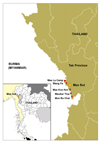Community engagement on the Thai-Burmese border: rationale, experience and lessons learnt
- PMID: 22984375
- PMCID: PMC3442337
- DOI: 10.1016/j.inhe.2010.02.001
Community engagement on the Thai-Burmese border: rationale, experience and lessons learnt
Abstract
Community engagement is increasingly promoted in developing countries, especially in international health research, but there is little published experience. The Shoklo Malaria Research Unit (SMRU) conducts research with refugees, migrant workers, displaced people, and day migrants on the Thai-Burmese border, and has recently facilitated the set up of the Tak Province Border Community Ethics Advisory Board (T-CAB). Valuable lessons have been learnt from consultation with the T-CAB especially in the area of participant recruitment and the informed consent process. A lot of new research questions have emerged from consultation with the T-CAB. This paper describes our experience, lessons learnt and the unique challenges faced working with the T-CAB from its initial conception to date. We conclude that consultation with the T-CAB has made improvements in our research in particular operational and ethical aspects of our studies.
Figures


References
-
- Morin SF, Morfit S, Maiorana A, Aramrattana A, Goicochea P, Mutsambi JM, et al. Building community partnerships: case studies of Community Advisory Boards at research sites in Peru, Zimbabwe, and Thailand. Clin Trials. 2008;5:147–56. - PubMed
-
- Cox LE, Rouff JR, Svendsen KH, Markowitz M, Abrams DI. Community advisory boards: their role in AIDS clinical trials. Terry Beirn community programs for clinical research on AIDS. Health Soc Work. 1998;23:290–7. - PubMed
-
- Weijer C, Goldsand G, Emanuel EJ. Protecting communities in research: current guidelines and limits of extrapolation. Nat genet. 1999;23:275–80. - PubMed
Grants and funding
LinkOut - more resources
Full Text Sources
Miscellaneous

